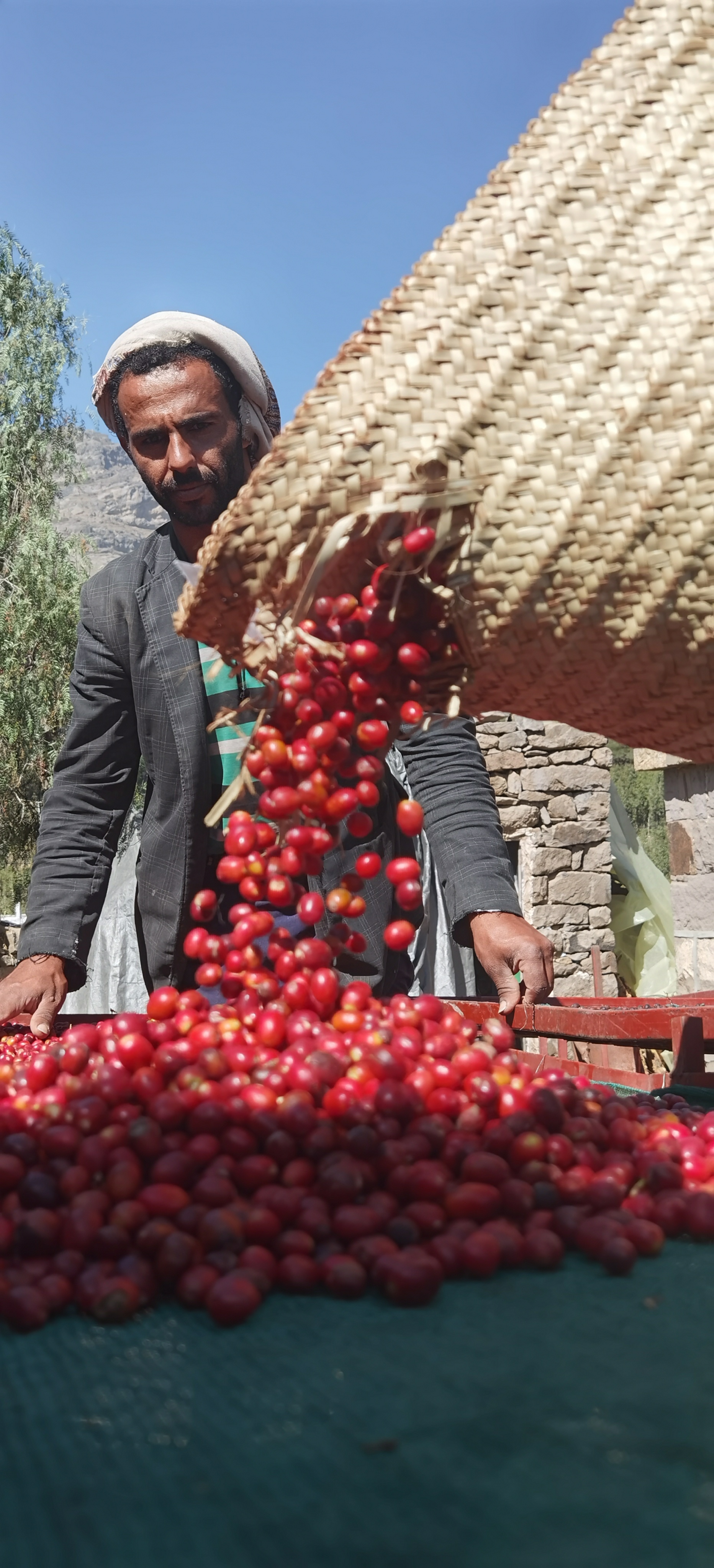We’re delighted to see the arrival of our fresh harvest Yemeni Mokha coffees this week, sourced from Abdulrahman Hayel Saeed and his team at Sabcomeed. https://sabcomeed.com
This year’s selection of micro-lots, both sun-dried naturals and anaerobic natural coffees, from across the key regions of Haraz, Anis, Bani Matar and Al-Qafr. We have collective lots from groups of producers around coffee producing villages, and single farmer micro-lots reflecting the varietals, terroir and craft of that producer.
We’ll be presenting coffees from Fawaz Ali Wahab (and you can read a little more about him and his family below), Abdulkarim Salaah, Fouad Al Fadli, and the Masar and Shaia’an Collectives.
With the sun rising on a new day, Fawaz Ali Wahab stands outside his small mountainside home and looks out at his coffee trees planted along the carefully forged terraces stepping their way up the steep slopes. Like all the small villages in this remote, unforgiving mountainous region of Yemen, Fawaz’s tiny plot clings to the mountainside, almost gravity-defying as they have done for centuries.
Fawaz is 38 and lives with his family in the tiny mountain village of Wadi Masar which sits around 2,000 metres up in the West Haraz region of Yemen, about 100km from the capital Sana’a. Fawaz has lived all his life in this area, taking over the family plot with his siblings, following his Father’s retirement.
Unlike Fawaz, a growing number of small farmers in this region have returned to their villages and family farms, after feeling forced to abandon their homes and jobs in Sana’a as a result of the increasingly dire political and economic crisis there. The revival in popularity of Yemeni coffee over the last decade, and the prices it now attracts in the international speciality coffee market, has offered a lifeline to farmers in Yemen, enabling them to generate much-needed income for their families.
The story of Yemen and coffee goes back centuries. Whilst Ethiopia is recognised as the birthplace of coffee, it was Yemen, and its famed trading port of Mokha, that brought coffee as we know it, to the wider World. From the 15th to the 18th centuries, Mokha was renowned as a major marketplace for coffee trade.
Fawaz is part of a of a small group of coffee farmers in Yemen supplying their stunning coffee to Dark Woods, through our relationship with Sabcomeed, the progressive local exporter, building bridges between Yemeni coffee farmers and craft roasters around the World.
Each year, the Sabcomeed team travel to Wadi Masar and other nearby villages to work with the farmers; and set up camp in the area, just before harvest time. Over the following weeks, they work alongside farmers and artisans to create a local collection hub, constructing small drying tables and sorting areas where farmers bring and dry their coffee cherries.
Their approach is not typical amongst exporters; it helps Sabcomeed and the farmers to maintain the exceptional quality and consistency for which they have become known; but more importantly, it shares risk and reward between farmers and exporter. Together, Fawaz and his neighbours, with the team at Sabcomeed, are keeping the legend of genuine Mokha coffee alive.
We cannot write about Yemen without focussing on the heart-breaking human tragedy of the long-running war and its impact on the population there. For almost eight years now, a civil war has been raging in Yemen, causing thousands of civilian deaths, and the World’s worst current humanitarian crisis.
Fawaz and his community are, thankfully, a little removed from the worst effects of the fighting, faced by millions of people in Yemen, but it still impacts them and those around them. In large parts of Yemen now, millions of people are experiencing severe hunger and hardship. A recent study shows that around 16.2 million people (54% of the population) are currently facing acute food insecurity. Medical supplies are in desperately short supply and almost half of the country’s hospitals and clinics have been forced to close.
You can support small farmers in Yemen by buying their coffee.
If you want to find out more about the crisis in Yemen or to support charities working in the country, you can find more information in this Guardian article here, or at the Disasters Emergency Committee (DEC) here.’

